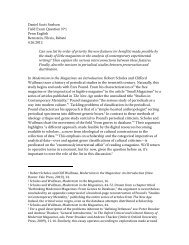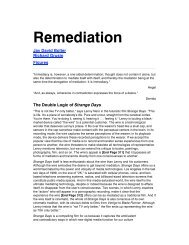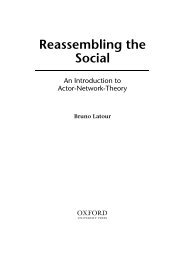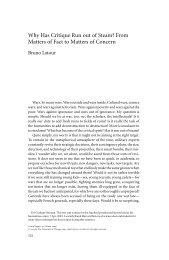The Exploit: A Theory of Networks - asounder
The Exploit: A Theory of Networks - asounder
The Exploit: A Theory of Networks - asounder
Create successful ePaper yourself
Turn your PDF publications into a flip-book with our unique Google optimized e-Paper software.
Coda: Bits and Atoms<br />
<strong>Networks</strong> are always exceptional, in the sense that they are always related,<br />
however ambiguously, to sovereignty.<br />
This ambiguity informs contemporary discussions <strong>of</strong> networks and<br />
the multitude, though in a different fashion. Hardt and Negri, for<br />
instance, describe the multitude as a “multiplicity <strong>of</strong> singularities,” a<br />
group that is unified by “the common” but remains heterogeneous in<br />
its composition. <strong>The</strong> multitude is, in their formulation, neither the<br />
centralized homogeneity described by Hobbes nor the opposite condition<br />
<strong>of</strong> a purely digressionary chaos. “<strong>The</strong> concept <strong>of</strong> the multitude<br />
rests on the fact, however, that our political alternatives are not limited<br />
to a choice between central leadership and anarchy.” 1<br />
Hardt and Negri find indications <strong>of</strong> such a multitude in the worldwide<br />
demonstrations against the WTO, in the different Latin American<br />
peasant revolts, and in the tradition <strong>of</strong> the Italian “workerism”<br />
movement. For them, such examples <strong>of</strong>fer a hint <strong>of</strong> a type <strong>of</strong> political<br />
organization that resists the poles <strong>of</strong> either centrist sovereignty or<br />
centerless anarchy:<br />
149









